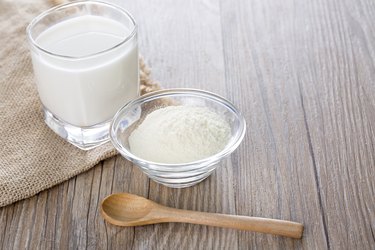
Vegan milk alternatives are a wildly various bunch. If it's powdered milk you're after — whether to keep on-hand for emergency shortfalls, beef up a bread recipe or add body to smoothies — you have several options to choose from. Each has distinct benefits and uses, so you just might decide to clear out a pantry shelf and stock them all.
Find out about the characteristics of the many plant-based dry milk substitute options out there, as well as ways to incorporate them in your cooking.
Video of the Day
Video of the Day
1. Soy Milk Powder
Powdered soy milk is a great option if you're looking for a protein source, says Suzannah Gerber, executive chef of Haven Foods and author of Plant-Based Gourmet.
Reconstituted soy milk powder tends to curdle at high heat and with the addition of acids. This is because of soy's natural proteins — the same proteins that give soy a hearty texture and a rich consistency, which lends a creamier mouthfeel to baked goods, sauces, gravies and soups.
Soy milk powder is best paired with a bit of vanilla or maple syrup to help lend it a similar flavor to commercially available liquid soy milk, which is usually lightly flavored or sweetened, Gerber says.
Two tablespoons of powdered soy milk pack in 60 calories, 0 grams of fat, 4 grams of carbs (with 2 grams of sugar and 2 grams of fiber) and 7 grams of protein.
A brand we love: Druids Grove Organic Soy Milk Powder
Read more: What Are the Dangers of Drinking Soy Milk?
2. Rice Milk Powder
Although it doesn't thicken to the same richness of soy, unflavored powdered rice milk has a more "dairy" flavor than soy. It lacks soy's accompanying sweetness, as well as soy's tendency to curdle.
Rice powder, much like the milk, is very bland, says Elysabeth Alfano, plant-based chef and award-winning media personality, who adds that its neutral flavor makes it very versatile for different types of recipes. Keep in mind, though, that this pick lacks protein.
Two tablespoons of powdered rice milk pack in 70 calories, 0 grams of fat, 17 grams of carbs (with 3 grams of sugar and no fiber) and no protein.
*A brand we love: *Better Than Milk Vegan Rice Dry Milk Powder
3. Nut-Based Powders
Nut powders are closer to flour than milk, says Alfano, who likes to use them in baking. That's particularly true for cashew milk powder: "Cashew flour or powder is dreamy. It's rich and tasty and lends itself well to savory dishes," says Alfano.
Two tablespoons of powdered cashew milk pack in 60 calories, 3 grams of fat, 9 grams of carbs (with 3.5 grams of sugar and no fiber) and 1.5 grams of protein.
Brands we love: Z Natural Foods Cashew Milk Powder and JOI Almond Milk Nutbase
4. Coconut Milk Powder
Coconut milk powder is another great vegan option that boasts a slightly sweet coconut flavor (unsurprisingly). It's one of Gerber's favorites, since it's readily available, reconstitutes easily with water and doesn't require heat or any special equipment. However, some varieties will contain casein, a milk derivative, so read the label carefully before purchasing if you are avoiding dairy completely.
You'll get 120 calories, 6 grams of fat, 2 grams of carbs (no sugar or fiber) and no protein in a two-tablespoon serving of coconut milk powder.
Brands we love: Anthony's Organic Coconut Milk Powder and KOS Organic Coconut Milk Powder
Tip
Dairy milk powder started its "life" as liquid milk that's heated until about half of the milk solids evaporate. Adding water back into powdered dairy milk is easier than adding water to vegan milk substitutes, which are generally derived from superfine grinds of solid vegetable matter, but doing so is still possible: “I usually reconstitute in a blender to get a creamier mixture and avoid clumping,” Alfano says.
4 Ways to Use Vegan Powdered Milk
Reconstituting powdered milk with water and then drinking it is just one of many ways to use it. Here are more options:
- Whip up vegan chocolate: Use powdered soy or coconut milk to make vegan chocolate, says Gerber. It's a good option since liquid non-dairy milk doesn't work for tempered chocolate. "Molded chocolates or a nice nut-and-fruit chocolate bark is made extra delicious with some powdered coconut milk melted into the cacao butter first," Gerber says.
- Make a treat: Alfano suggests replacing some — or all — the flour in baked goods with powdered vegan milk. Here's a decadent idea: Use peanut butter powder for extra protein and flavor when you're making homemade energy bites and bars, Alfano suggests.
- Try your hand at whipped icing: Mix powdered vegan milk (Gerber suggests coconut or oat) with cold water and then add your desired amount of sweetener. Stir in more powdered milk as needed to thicken this topping, Gerber says.
- Use it to thicken soup: For a creamier soup, add a teaspoon of powdered plant milk, Gerber suggests. You can also use powdered milk in smoothies for a richer texture, Alfano says.
How to Store Vegan Powdered Milks
Powdered dairy milk lasts between two and 10 years. The vegan version? Not too long. “Vegan powdered milks won’t last years like their animal-product counterparts,” Alfano says, adding that most have a shelf life of between six months and a year. Check the packaging when you purchase to confirm how long it’s good for. To get the most mileage out of them, store vegan milk powders in a cool, dry cupboard, protected from moisture.